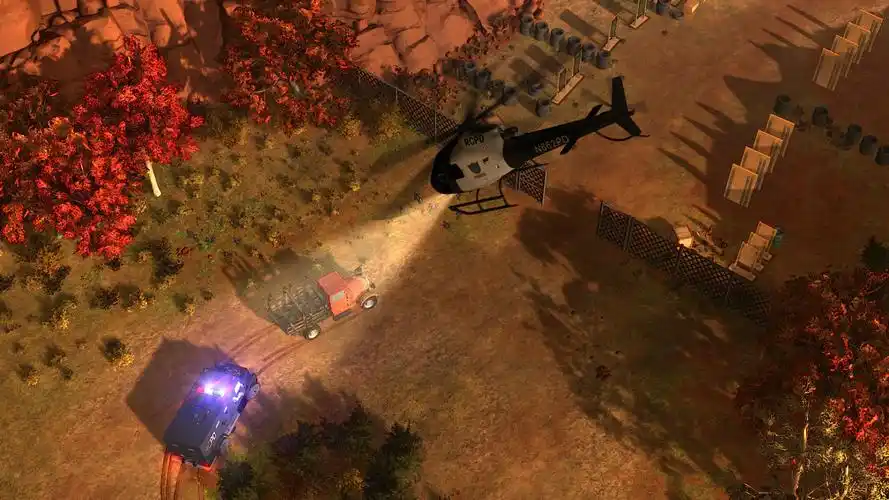Title: The Unseen Walls: A Journey Through "Betrayal Pandemic Shelter Sign Installer Simulator VR - Mount Missions DLC"
The virtual reality landscape is often one of fantastical power, heroic deeds, or terrifying survival. We become space marines, legendary wizards, or post-apocalyptic scavengers. Rarely does it ask us to become the anonymous, essential cog in a crumbling machine. "Betrayal Pandemic Shelter Sign Installer Simulator VR" was already a niche masterpiece of mundane dystopia, and its new "Mount Missions" DLC doesn't expand the map; it deepens the chasm of its haunting, quiet despair.
The base game’s premise was brutally simple: you are a contractor for a nebulous, quasi-governmental agency during a global pandemic. Your job is not to find a cure or fight infected hordes, but to install standardized metal signs designating buildings as official "Pandemic Shelters" on increasingly deserted city streets. The "Betrayal" in the title was always multifaceted—the betrayal of public trust, the betrayal of a society by its failing institutions, and the personal betrayal of your own ethics for a paycheck. The "Mount Missions" DLC escalates this by taking you out of the familiar urban decay and into the oppressive silence of the mountains.
Gone are the distant sirens and occasional muffled coughs from behind boarded-up windows. The only sound in the Mount Missions is the wind, a constant, whispering presence that moans through pine trees and rattles the heavy, cold metal of your sign kit. The DLC introduces a new, more rugged set of equipment. The standard rivet gun is replaced by a heavy-duty hammer drill for securing signs to rock faces. Your harness becomes a lifeline, not just a tool, as you rappel down cliff faces to reach designated installation points on remote ranger stations, isolated observatories, and secluded luxury bunkers built for a wealthy elite that has long since vanished.

This shift in environment is the DLC's first, and most brilliant, layer of commentary. The "shelters" you are labeling are no longer community centers or schools. They are monuments to isolationism. One mission has you installing a massive, polished brass sign on the reinforced steel door of a billionaire's apocalypse vault, carved into the mountain itself. The instructions are meticulous: the sign must be perfectly level, the screws polished. The irony is palpable. You are applying a government seal of approval, a symbol of public order and safety, onto a private fortress designed explicitly to escape the public and its plight. The work is technically challenging, requiring careful balancing on a narrow ledge, but the true weight is philosophical. Who is this sign for? The occupants inside, who don't need it? Or the desperate souls outside who will never be allowed in?
This is where the "Betrayal" evolves from a background theme into an active mechanic. In several missions, as you are perched on a mountainside, a new radio frequency crackles to life. It’s not your corporate overseer; it’s the "Mountain Collective," a scattered group of survivors hiding in the wilderness, refusing to enter the state-mandated shelters which they believe are less about safety and more about control. They beg you, the installer, to sabotage your work. "Don't mark the old ranger station," a voice pleads, static cutting through her words. "It's one of the last places they don't know about. Just… drop the sign. Tell them it broke. Please."
For the first time, the simulator presents a real choice. Do you complete your assigned task with professional detachment, ensuring your digital paycheck and furthering a system you know is corrupt? Or do you commit a act of digital vandalism, deliberately fumbling the expensive sign and watching it clatter hundreds of feet into the ravine below? The game doesn't reward or punish you overtly. Your corporate handler will chastise you for incompetence and dock your pay. The survivors will thank you, a moment of human connection that feels more valuable than any currency. But the mountain remains silent, indifferent to your moral choice. The system grinds on.
The VR immersion is what makes these moments devastating. The physical act of drilling into solid rock, feeling the controller vibrate with each impact, is intensely satisfying on a primal level. Yet, that satisfaction is immediately poisoned by the context. You are defacing a beautiful, ancient cliff face to mount a lie. The sheer scale of the mountain vistas, rendered with a stark, beautiful realism, dwarfs your existence and your pointless task. You are an ant decorating a tomb.
The "Mount Missions" DLC is not fun in a traditional sense. It is a profound and stressful experience. It uses the language of simulation—realistic physics, tedious tool management, precise objectives—to craft one of the most effective critiques of late-stage capitalism and crisis bureaucracy ever presented in a game. It argues that in the face of collapse, the most insidious roles aren't those of the tyrants or the heroes, but of the quiet functionaries, the technicians who, by simply doing their job with enough skill, grease the wheels of a broken world. It forces you to feel the weight of a single rivet, and in doing so, understand the weight of complicity. It’s a bleak, brilliant, and unforgettable piece of virtual commentary that will leave you staring at your controllers long after the headset comes off, wondering what silent mountains you are currently climbing in the real world.
Tags: #VRGaming #GameReview #SimulatorGames #DystopianGaming #VRCritique #PandemicNarrative #IndieGames #PhilosophicalGames #BetrayalPandemicShelter #MountMissionsDLC #GamingAsArt #CriticalDistance #VRExperience


















